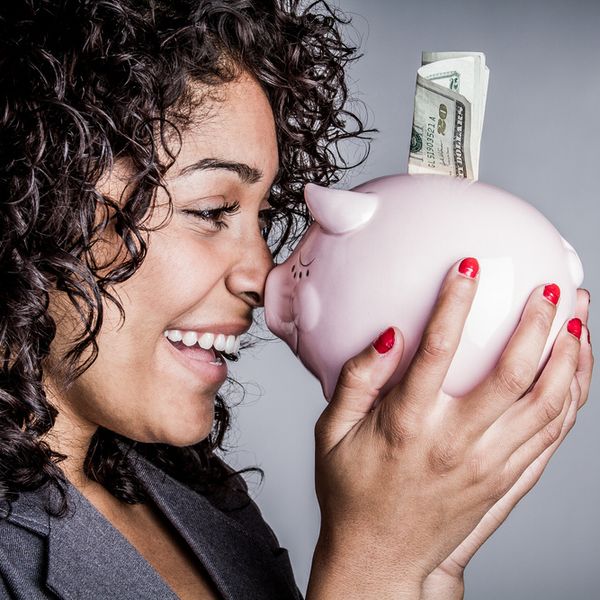
Personally, I don't know any billionaires. Do you? (I know, right?) So, since our monthly—or if we're lucky, bi-weekly—paychecks seem to come and go so freakin' quickly, I'm assuming that it's a fairly safe assumption that we're all trying to figure out how to make our money stretch. And voila—here it is. While there are probably a million times 10 ways for you to save money, I put together 10 hacks that are pretty easy to implement and can definitely help your bank account from going into overdraft.
Are you ready to save some extra dollars for a rainy day—or, at the very least, not go into (further) debt?
1. Set Long-Term Goals
I'm someone who grew up going to yard sales and thrift stores. It wasn't because we couldn't afford to buy the "new-new ish", it was that my mom enjoyed finding rare items at a good price. The influence definitely rubbed off on me, so I tend to lean towards the same kind of shopping experiences. The challenge is, when you already know that you're getting a great deal, you can find yourself buying so much stuff that you don't really need, which ultimately still means that you could be destroying your budget. Something that helped me to break this habit was to set long-term goals. For instance, rather than getting 15 outfits from a thrift store or 20 tees on Etsy (Etsy has some dope black culture stuff), I would tell myself that I'd rather remodel my living room or save up for a plane ticket to see my godchildren.
Setting long-term goals is a great way to encourage yourself to be a responsible spender while also preventing you from spending money, that you don't really need to, on all sorts of —let's be real, shall we?—randomness.
2. Eat Out Less
Did you know that the average American spends a whopping $3,000 a year, just on eating out? Geeze. Matter of fact, I've got a friend whose accountant scolds him on the regular. Why? It's because he easily spends double that amount because he never (ever) cooks at home. As someone who enjoys preparing my own meals and also going to restaurants, I can vouch for the fact that when I choose to only eat out 3-4 times a month (max), my expenses drop significantly. So, if you're looking for a way to keep an extra $250 a month in your pocket (because 3,000 divided by 12 is $250), eat at home sometimes. It's cost-effective and actually much healthier for you too (since you know exactly what is going into your food and who is preparing it).
3. Create a Shopping List and Food Calendar
I'm pretty sure you've heard somewhere that you should never go grocery shopping when you are hungry and that would absolutely be correct. When you already want to eat, suddenly everything looks good in just about every aisle. That's one reason why it's always wise to go grocery shopping with an already made out list in tow. Another reason is so you'll actually remember what you need (I can't tell y'all how many times I've bought paper towels over and over…and over again). Along with a list, you know what else can come in handy? A food calendar. If you're not familiar with those, they can help you to plan out your meals for the week, so that you shop based on what the calendar says that you are going to make. This can save you money because, if you like to eat a lot of produce, you won't get more than you actually need; that way, your fresh fruits and veggies won't spoil. As a bonus, a food calendar can save you time while you're in the store (if you're someone who actually hates to grocery shop) too because you'll know exactly what you need, so you can get in and get right out. You can get tips on how to use your Google calendar to implement this lil' hack here.
4. Make Your Place More “Green”
Are you sick and tired of your utility bills being totally off the chain? When's the last time you "green-erized" your home? That's not actually a word, but I made it up because it fits in this instance. Sealing your windows can reduce the drafts that cause you to change the temperature on your thermostat a lot. Getting a low-flow showerhead can help you to use as much as 60 percent less water (whenever you shower) each month. Make sure that your light bulbs are LED ones; not only are they cheaper than incandescent bulbs but many last for as much as 50,000 hours (there are approximately 8760 hours in any given calendar year, so you do the math). Defrost your refrigerator and freezer before around 1/4 inch of ice builds up so that they'll both run more efficiently. Stop opening your oven while you're cooking; every time you do, that causes the stove to drop 25 degrees which results in the oven needing more time to heat up again.
Unplug whatever you aren't actually using; you're wasting around a dollar of electricity for each day you've got something in an outlet that doesn't actually need it (this includes your cell phone. Let it charge up before going to bed and then disconnect it from the charger). The power grid that you're on is probably running at its peak between the hours of 4-6pm. So, try and make it a practice to turn on your dishwasher before turning in at night. It will put less strain on the grid and can actually cool down your house in the process. During the summer, try and keep your thermostat at around 75 degrees (turning on your ceiling fan can drop the temp about four more degrees) and 69 degrees during the winter season; it will save energy costs between 4-6 percent (besides, setting your thermostat lower doesn't make your home cool down any faster). Make sure your thermostat is electronic too; that can easily save you between 10-30 percent on your energy bills. Replace your HVAC filter every 90 days, without fail. That will keep it from working harder than it needs to.
5. Ditch Your Cable (Watch the Streaming Services Too)
I'm an ambivert. So yeah, I've got cable in my home (if you're an ambivert or introvert, I'm pretty sure you're able to connect the dots). That doesn't mean that I don't have a conversation with myself, shoot, at least once a month, when I'm like, "Girl, you could save so much money if you let this cable go." My package is around $150 a month, and a part of what comes in that package, I don't even use, so that soft inner voice is spot-on. I'm honestly just lazy when it comes to switching over to loading all of the streaming packages vs. using a remote control. Plus, there are some Black cable stations that I dig. But the thorn in my side has absolutely nothing to do with y'all. $150 times 12 is $1,800. That's a nice chunk of change. So, if you want to put a down payment on a car or something, disconnecting your cable can definitely put you onto the path.
Oh, and watch out for the streaming services too. Yes, Netflix is (currently) between $13-15 a month, Hulu is (currently) between $6-12 a month and UMC is (currently) $50 a year—but if you've got all of these (and more), you're still spending a small mint. Choose wisely.
6. Bundle Your Insurance Polices
Insurance companies. Y'all, that's a Twitter thread all by itself. But the reality is they are a "necessary evil" and a business—and businesses like to offer deals. Another way to keep a little extra money in your pocket is to bundle your insurance policies. For instance, if you bundle your home and auto insurance packages, you can easily save as much as 16 percent on your overall insurance costs each month. Hmph. I'm thinking that you could probably save even more. It's all about hitting up your insurance company and doing a little negotiating. Most of them are open. If they're not, remember that there are always others who will gladly take your hard earned cash. You can check out some of the best home/car insurance bundles for 2020 here.
7. Always Use Coupons and Promo Codes
Something that I have downloaded on my browser is Honey. Basically, it's an app that, whenever you shop online, it tries to find any savings that might be relevant to it. Matter of fact, it works so well that PayPal purchased it for four billion dollars last fall. If, for some reason, the thought of an app "reading" all of your sites freaks you out (you might wanna get off of Al Gore's internet, for one), then use a site like RetailMeNot to check out the promo codes on there. Over time, I've saved a mint, using both. Oh, and don't forget about downloading coupons from your phone when you're at the grocery and drug store too. You ain't never too young to clip (and scan) coupons. If you'd like a few coupon hacks and tips, the Krazy Coupon Lady totally has your back. Go here to start perusing.
8. Avoid Using Autofill on Your PC
On the heels of what I just stated, let me just put it right on out there and say that I absolutely do not do what I am about to recommend. I think it's because I'm not an online shopaholic. But if you happen to be one, something else that can save you some money over time is to remove the autofill feature on your PC. If you use Gmail, click on the Google apps option on the far right, then click on "account" and "payment & subscriptions" and delete any of the credit or debit cards that you've got there. That way, if something that catches your eye, you won't make an impulsive move whenever the autofill info comes up on the payment screen. You'll actually have to get up and find your cards first, which could prevent you from buying the item in the first place.
9. Implement a 48-Hour Rule
Speaking of removing autofill, how about taking things up a notch and disciplining yourself to not purchase anything online that interests you until you've waited a full 48 hours later? I'm willing to bet that a good 6 times out of 10, you'll come to realize that you don't need or even want it as much as you initially thought that you did. Or, you'll come to the conclusion that you should wait until it makes more financial sense to buy it or until it comes on sale.
10. Put Your “Fun Money” in an Envelope
The definition of the word "tithe" is one-tenth of something. Just like many Christians tithe to their church, I'm a firm believer that you should also tithe to yourself; literally set aside one-tenth of your income that can go strictly to whatever you want to spend it on. But just to make sure that you don't tip over into your money that's set aside for other things, consider pulling that tenth out of your account and putting the cash into an envelope. There is something about seeing cash and breaking bills that can psychologically make us want to be more cautious with our spending. Plus, once that's gone, it's gone until the next payday, which can also keep you from overspending. Be good to your coins, y'all. They are so much better to you when you are.
Join our xoTribe, an exclusive community dedicated to YOU and your stories and all things xoNecole. Be a part of a growing community of women from all over the world who come together to uplift, inspire, and inform each other on all things related to the glow up.
Featured image by Shutterstock
- 5 Steps to a Frugal Wedding on a Budget - xoNecole: Women's ... ›
- Over Sallie Mae? I Paid Off 20K In Student Loan Debt In 2 Years ... ›
- 20 Ways to Cut Spending | The Motley Fool ›
- 11 Simple Ways to Lower Your Monthly Bills and Save Money ... ›
- How to save: How to cut your monthly expenses by over $700 ›
- How We Cut our Monthly Expenses by 50% | Tips that Worked ›
- 30 Ways To Cut Your Monthly Expenses ›
- How to Lower Your Bills: 40 Ways to Save - NerdWallet ›
- How to Save Money: 35 Ways to Reduce Expenses - Clark Howard ›
- 40 Ways to Save Money on Monthly Expenses - The Simple Dollar ›
This Is How To Keep 'Holiday Season Stress' From Infecting Your Relationship
Hmph. Maybe it’s just me, but it seems like there is something really weird happening in the fall season air (because winter doesn’t officially begin until December 21) that cuddle season is in full swing while break-up season is as well. In fact, did you know that break-ups are so popular during the holiday season that December 11 is deemed Break-Up Day?
The reasons why relationships shift around this time vary; however, I did both roll my eyes and chuckle when I read that a very popular one is because it’s an easy way to get out of getting one’s significant other a Christmas present. SMDH.
Anyway, I personally think that the less shallow folks out here may contemplate calling things “quits” or they at least distance themselves a bit from their partner (and what I’m referring to is serious relationships) due to all of the stress and strain that oftentimes comes with the holidays whether it be financial, familial, due to their tight schedules or something else.
Listen, I would hate for you and your man to miss the fun and happiness of experiencing this time of year, all because you are so overwhelmed or irritated that you can’t really enjoy it. That’s why I have a few practical tips for how to avoid allowing the typical holiday season stress from INFECTING your relationship.
Manage Your Expectations
 Giphy
GiphyUnmanaged expectations. If there is a main reason why the holiday season tends to be so stress-filled for so many people, I’d bet good money that this is the cause. And when you’re in a long-term relationship, expectations can manifest themselves in all sorts of cryptic and/or unexpected ways. You might have relatives who assume that you are going to be with them for Thanksgiving or Christmas when you have other plans in mind. You might be thinking that you are going to spend one amount for presents while your man is thinking something totally different. When it comes to scheduling, your signals may be crossed.
And you know what? To all of these scenarios, this is where clear and consistent communication come in. Don’t assume anything. Don’t dictate anything either. From now until New Year’s, mutually decide to check in once a week, just to make sure that you are both on the same page as it relates to the holidays and what you both are thinking will come along with it. The less blindsided you both feel, the less stressed out you will be. Trust me on this.
Set (and Keep) a Budget
 Giphy
GiphyOkay, so I read that last year, 36 percent of Americans incurred some type of holiday-related debt. Hmph. Last year, there was still some sense of normalcy in this country, chile, so I can only imagine what finances are gonna look like over the next several weeks. That said, since I don’t know a lot of people who don’t find being broke stressful, make sure that you and your bae set a budget and then stick to it this year — no ifs, ands or buts.
Because really, y’all — it doesn’t make sense to deplete savings and/or max out credit cards for a few days of giggles only to be damn near losing your mind because you don’t know how to make ends meet come Dr. Martin Luther King, Jr. Day.
And by the way, this tip doesn’t just speak to things like food and gifts; I also mean travel. If it doesn’t make a ton of sense (or cents) to be all over the place this year — DON’T BE.
Keep Matthew 5:37 at the Forefront
 Giphy
GiphyIf off the top of your head, you don’t know what Matthew 5:37 says, no worries, here ya go: “But let your ‘Yes’ be ‘Yes,’ and your ‘No,’ ‘No.’ For whatever is more than these is from the evil one.” That verse right there? Oh, it’s a boundaries lifesaver! I say that because do you see “maybe” or “I’ll think about it” in there? Nope. LOL. It says that you should tell people “yes” or “no” and leave it at that — and that complements Anne Lamott’s quote, “’No’ is a complete sentence” impeccably well. Yeah, you’ve got to remember that anything beyond a yes or no to a request is privileged information; you don’t owe anyone details or an explanation.
Besides, if you are really honest with yourself, when someone asks you something and you give a “Umm, let me think about it” kind of reply, more times than not, you already know what your answer is going to be — so why not let you both off of the hook? Give your response. Commit to that. And let everyone (including yourself) get on with their lives and schedules.
I promise you that when it comes to those holiday parties, you are pissing more folks off by not RSVP’ing or doing so and not showing up than just saying, “Thank you but not this year” off the rip.
Remember That Your Personal Space Is Privilege Not a Right
 Giphy
GiphyA friend of mine recently bought a new house and invited me over to come see it. He’s a single man with no children, so as I was taking in all of the space that he had, especially as I walked through his finished basement, I joked about relatives coming to live with him. “Hell no” and “absolutely not” were pretty much his immediate responses as he went on to say that some folks even had the nerve to be offended when he told them that he had no intentions on taking DNA in.
Ain’t it wild how people think that your stuff is their right? And yes, that brings me to my next point. Your home is your sanctuary space. If you want to host folks this year — cool. If not, ALSO COOL. Please don’t let folks (family included) guilt you into how they want you to act or even into what they would do if the shoe was on the other foot. You are not them — and as one of my favorite quotes states, “If two people were exactly alike, one of them would be unnecessary.” (A man by the name Larry Dixon said that.)
Hell, my friends? They know that I am good for sending them random things that they need or even want all throughout the year. Coming over to hang out at my pace, though. Uh-uh. Chalk it up to being a card-carrying member of the ambivert club yet I like keeping my living space personal — and I sleep like a baby, each and every night, for feeling that way.
Always remember that your space, your time, your resources, your energy and shoot, yourself period (including your relationship), are all things that are your own. You get to choose how, when and why you want to share them. The holiday season is certainly no exception.
Cultivate Some “You Two Only” Traditions
 Giphy
GiphyIt’s not uncommon for some couples to hit me up after the holiday season to “detox.” Sometimes it’s due to the financial drama (and sometimes trauma) that they experienced. Sometimes it’s because they allowed their relatives (especially in-laws) to get more into their personal business than they should’ve. More than anything, though, it tends to be because they didn’t get enough quality time together and so ended up feeling “disconnected.”
Please don’t let that happen. Listen, I’m not even a holidays kind of woman and yet, I will absolutely sit myself down with some hot chocolate and chocolate chip cookies to enjoy a Hallmark holiday film or two. Aside from the fact that most of them are lighthearted and sweet, I also like that they usually focus on couples loving on each other amidst all of the holiday beauty and ambiance — which is something that all couples should set aside some time to do.
Maybe it’s a vacation. Maybe it’s a staycation. Or maybe it’s my personal favorite, A SEXCATION. Whether it’s for a few days, the weekend or even overnight — don’t you let the holidays go by without setting aside time for you and your man to celebrate one another. Don’t you dare (check out “Are You Ready To Have Some Very Merry 'Christmas Sex'?”).
GET. SOME. REST.
 Giphy
GiphyI once read that 8 out of 10 people get stressed out over the holidays and 3 out of 10 lose sleep during to it — and when you’re stress-filled and sleep-deprived, that can absolutely lead to hypersensitivity, making mountains out of molehills and even not being in the mood for sex.
Your relationship can’t afford to go through any of this, so definitely make sure to prioritize rest. I don’t care how unrealistic it might seem during this time, sleep should never be seen as a luxury; it will always and forever be a great necessity.
That said, try to get no less than six hours of shut-eye in (check out “6 Fascinating Ways Sex And Sleep Definitely Go Hand In Hand”) and even ask your bae to take a nap with you sometimes (check out “Wanna Have Some Next-Level Sex? Take A Nap, Sis.”). Not only will sleep help to restore your mind, body and spirit but, when it’s with your partner, it’s an act of intimacy that can make you both feel super connected, even in the midst of what might feel like chaos.
___
Holiday season stress is real. Still, never give it the permission or power to throw your relationship off. Put you and your man first and let the holidays be what they are gonna be, chile.
Let’s make things inbox official! Sign up for the xoNecole newsletter for love, wellness, career, and exclusive content delivered straight to your inbox.
Featured image by Shutterstock
“Late” is an interesting word. I say that because, based on the situation, being late can actually be subjective.
For instance, if you agree to show up somewhere at 11:30 a.m. and you pop in at 11:45 a.m., you are absolutely late. No wiggle room there. Yet when it comes to something like an apology? I mean, when you factor in a definition for late like “occurring, coming, or being after the usual or proper time” — how do you determine when the proper time should be? Is it supposed to be when you want to hear it, or when someone is ready to offer it and actually means the words behind it?
And that is why I decided to put emphasis on the word “late” for today’s topic. Because if you and someone break up and they approach you, well after the fact, with an “I’m sorry,” if you struggle with whether or not to accept it due to the timing of it all, you should definitely ponder that a bit.
And as you’re doing so, it might help to read a bit deeper into what an apology should look and live like, even from an ex, regardless of when it shows up.
Your “late.” Or his right on time.
Three Things That a True Apology Consists Of
 Giphy
GiphyIt’s kind of wild that when you work as a therapist/counselor/coach, a lot of people never really see you as human — and this can include your close relationships. What I mean by that is, it’s almost like they expect you to be free on-call therapy to the point where they “forget” to actually check on you sometimes.
Such is the case with one of my longest-running friendships. Even during the weeks between losing my mother and losing $4K (SMDH), she would just keep calling me to vent about her marriage. I finally got so fed up that I brought it to her attention that for the past couple of years, that is exactly what our friendship has been like: her venting, me listening without her being very invested in my life at all. In response, she texted me an apology — and boy, was it beautiful.
I’m not going to share the details of what she said; however, I am going to tell you three things that it consisted of because it’s what I believe ALL APOLOGIES should entail.
1. She took full ownership for what she believed that she did. I framed this point in this way because, something that everyone needs to forever keep in mind is the fact that two people start and, to a large extent, end relationships — and what I mean by that is, it’s never like one person was perfect and the other was the villain. That said, though, when someone is making an apology to another individual, they are going to own their part and articulate what that part is. It’s not gonna be a simple “My bad.”
It’s going to be “I am really sorry that I wasn’t there for you when you needed me” or “I apologize for taking you for granted” — something that sounds like they get the “offense” that transpired. By doing this, they recognize their missteps — and that is what puts people on the road to not repeating them.
2. She did not deflect or gaslight me. You know what one of the worst apologies are: It’s when someone says they are sorry and then follows it up with, “But you do it too” or “If you hadn’t done ‘A’, I wouldn’t have done ‘B.'” Justifying your actions is a surefire way to make someone believe that you don’t really think that you did something wrong (or that bad) in the first place. And really, how can they trust you (again) if that is how you feel? Oh, and don’t get me on gaslighting.
Ugh, ain’t nothing like someone claiming that they want to set things right with you, only to act like they don’t really get where you are coming from with the issues y’all were having in the first place. A good gaslight line in an apology: “If that is what you think happened, I apologize.” Yeah, you can keep that, jack. Never accept this kind of apology — because it isn’t one.
3. She addressed why she needed to make the apology in the first place. Wanna know one of the main reasons why I don’t trust people who don’t believe in having regrets (check out “Why Regret Might Not Always Be A Bad Thing”)? Did you know that apology means “a written or spoken expression of one's regret, remorse, or sorrow for having insulted, failed, injured, or wronged another.” How, as a human, do you think that you are out here not making any mistakes or poor decisions that you sometimes need to APOLOGIZE for? That is just…insane.
And one of the reasons why apologies are important is because if you feel bad about “failing” someone, it’s usually because you value them enough to want to keep them around. And yes, in my friend’s apology, she also explained why she didn’t want me to feel hurt in the way that she had hurt my feelings and what she would do to prevent that from happening in the first place.
So y’all, with all of this out of the way, before getting deeper into this topic? If an ex is hitting you up to apologize to you for something, please make sure that he hits all three marks of a true apology.
Now let’s keep going.
A Genuine Apology Should Also Include an Amends
 Giphy
GiphyA few years ago, I wrote an article for the platform entitled, “Heads Up: It's NOT An Apology If An Amends Isn't Made.” You know how I mentioned a second ago that a solid apology has no gaslighting in it? Hmph. Ain’t it wild how someone can do something that hurts or harms you and yet, they want you to just “hurry up and get over it”? GASLIGHTING.
Someone in my family, after unpacking years of abuse that I experienced at their hand, they had the nerve to say, “I’m not going to keep apologizing to you for this.” Hmm…Okay. So, how about you let me give you a consistent three months’ worth of the years of mistreatment that I experienced from you and then flippantly throw an apology your way. Let’s see how you feel about it. How much you believe that I am being genuine and sincere.
Listen — and please hear me GOOD on this: when someone really gets the magnitude of the pain or discomfort and inconvenience that they caused, they aren’t going to be fine with just saying that they are sorry for it; they are going to ask you what they can do to set things right.
It’s actually a part of the reason why I named the four children who I aborted (check out “Why I Named The Children I Aborted”) because I do have some real remorse for those decisions. Each of their names have an intentional meaning and I strive to leave out their purpose, through those names, on a daily basis. It’s a small way of making amends.
You know, back when my first book came out, my first love reached out, via email, to send me an apology. The apology hit most of the points that I mentioned earlier. Looking back, there wasn’t an offer to make an amends, though, and trust me, there was A LOT to make up for.
At the end of the day, amends means “reparation or compensation for a loss, damage, or injury of any kind; recompense” and while none of us should use bitterness, resentment or emotional stagnation as the “bar” for which we should expect amends to be made, if you’re trying to figure out just how sincere an ex is with their apology, if they want to do something to make things better, that’s a good sign.
There is a caveat, though.
Discern the Motives. Always.
 Giphy
GiphyEarlier this summer, I wrote an article for the platform entitled, “What's Your Motive For Sex? (It Reveals A Lot. Trust Me.)” Then, a few weeks ago, I wrote another article entitled, “As Cuffing Season Steadily Approaches, What The Heck Is 'Winter Coating'?” and boy, when I tell you that both of these complement this point really well? Goodness.
If you’ve never heard of the dating trend known as winter coating before, it’s basically when an ex creeps back up around cuffing season — and if you know what cuffing season is all about, you can absolutely connect the very probable motives behind those dots.
Now can there be exceptions? There are ALWAYS exceptions. Still, if you haven’t heard from your ex in years and here he comes a couple of weeks before Christmas, unless the two of you got together or broke up around the holidays, stay on potential “winter coating alert,” because it might not be about “building bridges” so much as getting into your bedroom.
That said, if it’s been a minute (six months or more) since you’ve heard from an ex and he suddenly reaches out to apologize, absolutely take out a moment to discern the motive — and shoot, feel fine with even asking what is causing him to make the move…now. If it’s in the spirit of the holidays and wanting to go into a new year with a clean slate, got it. If it’s because he’s been in therapy and realizes that he didn’t end certain things in his past very well, understood. If it’s because he didn’t like how the two of you broke up and he wants to try and make peace, that’s fair.
On the other hand, if you sense that he wants to rekindle something (check out “Nelly And Ashanti Are Giving It Another Shot? Here's What You Should Know About 'Ex Reconciliation'” and “I'm Thrilled That Ryan Destiny & Keith Powers Are Back Together. 5 Things Before Reuniting With Your Ex, Tho.” and “What Happens When 'The One Who Got Away'...Comes Back?”) — although that’s kind of another article for another time, do check that motive.
When someone apologizes, you should really be the only focus for them; not what they can get out of it on the back end. Listen, even if he hopes to get back with you (or back in bed with you), that shouldn’t be something that is discussed during the apology. If it is said or even implied, something about HIS MOTIVE is disingenuous. And if that is indeed the case, to a valid extent, so is he.
We All Should Give the Grace and Mercy That We Desire
 Giphy
GiphySooner than later, I’m going to write an article about forgiveness (beyond what I already have here). For now I’ll just say that if you are someone who thinks that other people don’t deserve forgiveness? That is either your pain or your ego talking and, either way, you can’t trust “their” judgment.
All of us mess up sometimes and if you are a karma (or you reap what you sow) believer, then you absolutely should want to extend others grace and mercy so that you can receive it in your own time of need (and you are absolutely delusional if you think a time won’t come, sooner than you probably think, that you will need it).
Besides, do you know all of the self-inflicted drama and trauma that comes from NOT forgiving others: higher blood pressure, insomnia, stress, anxiety, the higher risk of a heart attack, a weakened immunity, a greater risk for depression and anxiety — whatever he did, is it really worth all of this? Yeah, while a lot of people think that weaponizing forgiveness is empowering, really all it’s doing is putting themselves in harm’s way. Physically. Emotionally. SPIRITUALLY: “For if you forgive men their trespasses, your heavenly Father will also forgive you. But if you do not forgive men their trespasses, neither will your Father forgive your trespasses." (Matthew 6:14-15 — NKJV)
By the way, no one is saying that forgiving that man means that you have to allow him back into your life. After all, access is a privilege. Yet if he comes to you and acknowledges that he feels sorry for some things, for the sake of your own sanity, why not let him express it? Don’t wanna meet up or talk on the phone? Understood. Email and/or text are there for the taking. Don’t want to go back and forth? Who said that it needs to be a discussion or a debate?
All I know is, the more time you spend on this planet, the more you want to put out the energy that you want to come back. Forgiving others tends to make life easier. Not forgiving? Oh, the way that it boomerangs, sometimes in ways you never saw coming, chile. Dodge that kind of experience (and typically hard life lesson) if you can.
Yes, Better Late than Never
 Giphy
GiphyToo late to apologize. Yeah, I don’t really know if there is such a thing (because forgiving and reconciling are not one in the same and some of y’all will catch that later). I’ll wrap this up with a story to prove my point.
Once upon a time, I knew a woman who was in a serious relationship and yet, whenever her boyfriend would bring up the possibility of marriage, she would stall him out. When I finally asked her what her deal was, she explained that she still harbored so much pain from the man before him that she didn’t fully trust that he was the real deal. About five months later, here came her ex with a thorough explanation for why he made some of the decisions that he did while they were together. Now that she had the full story, she was able to heal. She got married to her boyfriend that following year.
You see where I am going with this? Although your ex’s apology might be “late” as far as y’all’s relationship timeline, the timing may be BRILLIANT when it comes to true when and why you actually need it. Yeah, a Scripture that I adore is “Timing is the Father’s business” (Acts 1:7 — Message) and sometimes those apologies, in the grand scheme of things, are more on time than you could ever imagine; they’re when God deems you need them not when you want to have them.
____
It is Oprah Winfrey who once said, “True forgiveness is when you can say, "Thank you for that experience” and sis, if you remove the bitterness and anger and look deeper, there were valuable lessons, even in and from the most challenging relationships. And that is worth appreciating through forgiveness and, if need be, full and complete release.
Bottom line, should you accept an ex’s late apology? Absolutely.
What better way to illuminate your present on a whole ‘nother level.
Just as forgiveness always does.
TRUST ME.
Let’s make things inbox official! Sign up for the xoNecole newsletter for love, wellness, career, and exclusive content delivered straight to your inbox.
Featured image by Shutterstock









